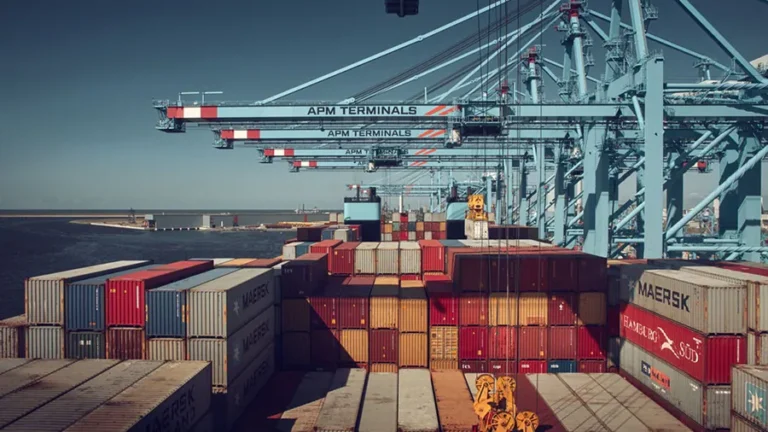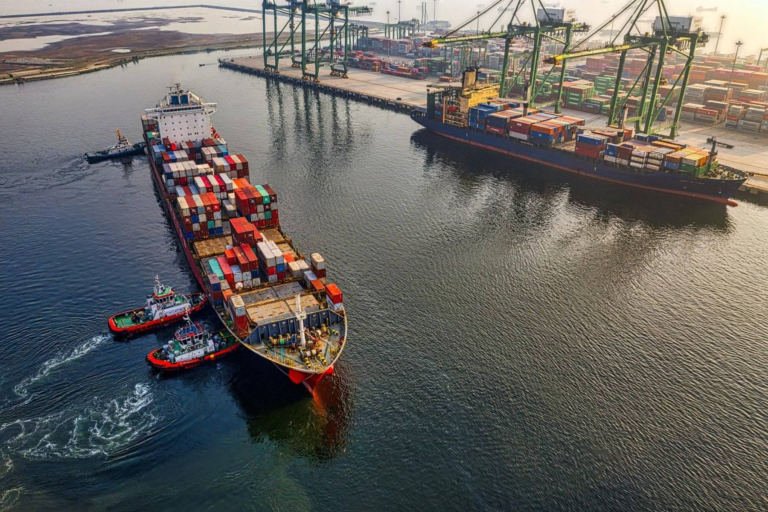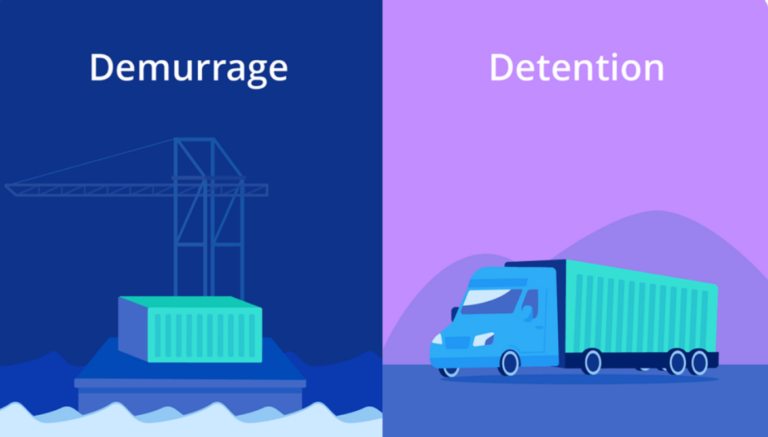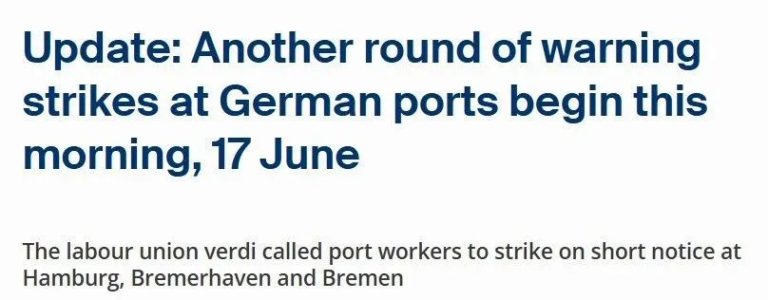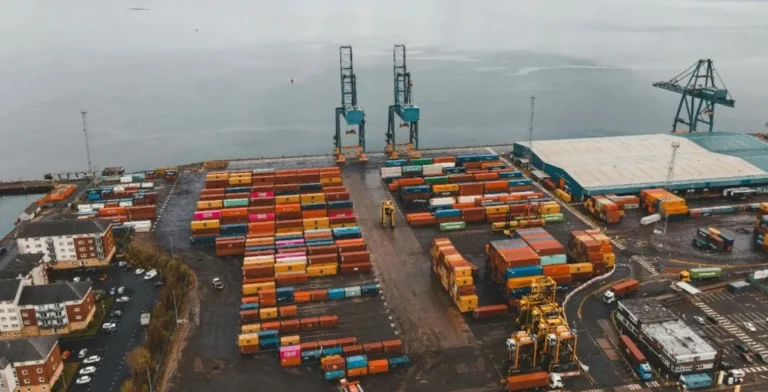East Coast Strike Looms, Port Emergency Plans in Place!
Shipping Lines Halt Container Bookings and Impose ‘Work Disruption Surcharge‘ !
A number of ports on the US East Coast and Gulf Coast are actively announcing their contingency plans in preparation for the dockworkers’ strike expected to take place on October 1st. In order to minimise the potential impact of the strike, these ports plan to continue operations during the weekend to ensure business continuity. Meanwhile, some shipping companies have already begun to take measures, including suspending the acceptance of new export orders and levying additional charges for cargoes that may be affected at the ports. These precautionary measures are intended to mitigate the potential impact of the strike on the supply chain and provide customers with clearer cost expectations.
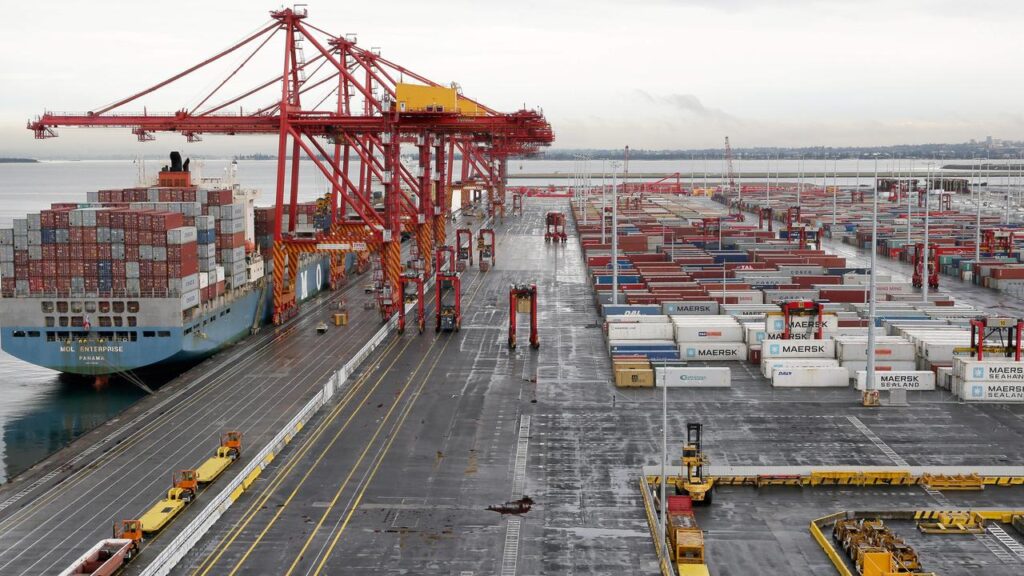
On Wednesday, the Port of Houston announced that its two container terminals will remain open until September 30th, allowing truck drivers to access the terminals and continue loading and unloading operations. In preparation for the upcoming strike, the delivery cutoff time for export cargo has been moved up by one hour. The port is considering whether to extend normal terminal operating hours next week and has already decided to open on Saturday, September 28th.
The announcement emphasized: “We strongly recommend that import cargo be picked up as soon as possible. Please note that any cargo still in the terminal after 7:00 PM on September 30th, 2024, will not be available for pickup until the strike is over.” To alleviate the burden on cargo owners, the Port of Houston also announced that it will waive import cargo detention fees incurred due to the strike. This measure aims to encourage cargo owners to clear customs promptly, avoiding cargo being stuck at the port during the strike.
The Port of Virginia, in its latest operational alert, announced that in response to the upcoming strike, it will open its two main container terminals and the Pinner’s Point Container Yard, which is dedicated to handling empty containers and chassis, on two Saturdays and one Sunday prior to the strike. This measure aims to provide shippers and transportation companies with additional time windows to complete necessary cargo loading and transportation before the strike begins. The port’s flexible arrangement reflects its commitment to customer service and its efforts to ensure the smooth flow of the supply chain in the face of potential industrial action.
The Georgia Ports Authority (GPA) issued a notice to customers on Wednesday, reminding all shippers to retrieve their cargo as soon as possible before October 1. The notice specifically pointed out that Savannah’s Garden City Terminal will suspend operations after the strike begins. To ensure that customers can process their cargo in a timely manner, the Garden City Terminal will remain open on the last two Saturdays of September and will provide full-day service on Sunday, September 29, to facilitate cargo retrieval. Savannah Port is the second busiest container port on the U.S. East Coast, following the Port of New York and New Jersey. It is operated by the Georgia Ports Authority (GPA) and competes mainly with Charleston Port in northeastern South Carolina and Jacksonville Port in southern Florida.
The Savannah Port has two primary modern deep-water terminals: Garden City Terminal and Ocean Terminal. Garden City Terminal is the largest container terminal along the Atlantic and Gulf coasts of the United States, while Ocean Terminal is dedicated to handling large volumes of breakbulk cargo. GPA further clarified that they will accept export containers, including refrigerated containers, until September 30. However, GPA warned that if refrigerated containers are not loaded onto vessels by the deadline, they will not be properly monitored and maintained once the port closes due to the strike. Additionally, GPA announced that no terminal demurrage fees will be charged to shippers during the strike, a measure intended to alleviate the potential financial burden customers may face during the industrial action.
Shipping companies have yet to disclose their contingency strategies for the upcoming strike. The International Longshoremen’s Association (ILA) has issued a warning to shipping companies of the U.S. Maritime Exchange (USMX), stating that all vessels transiting through East Coast and Gulf Coast ports will be closely monitored. Additionally, there is anticipation regarding whether the International Longshore and Warehouse Union (ILWU) on the West Coast will take coordinated action in support of the ILA strike. This could potentially lead to slowdowns at West Coast ports or, as the ILA president recalled from the 1977 East Coast strike, involve actions such as flying to the West Coast to prevent container ships from rerouting from East Coast to West Coast ports, resulting in a nationwide coastal disruption.
Willie Adams, the ILWU International President, stated, “As you continue negotiating and approaching contract expiration, the ILWU stands in solidarity with the ILA in fighting for a fair contract that respects dockworkers and protects our jurisdiction. From the East Coast to the West Coast, the ILWU and ILA remain steadfast and resolute in our battle against automation. We will not accept a substandard agreement that fails to adequately address our concerns for the future workplace and the safety of our members.”
ILA President Harold Daggett responded by saying, “Knowing we have the support of the ILWU gives us a powerful weapon against the many greedy shipowners who prioritize profits over people and fail to recognize the contributions your members and my members have made to this industry.”
Container shipping companies are also beginning to scale back some of their operations. According to several freight industry insiders, COSCO and ONE have stopped accepting new export orders bound for U.S. inland destinations. Hapag-Lloyd has notified its customers that it may increase vessel speed and prioritize unloading of import cargo in the days leading up to the strike. The company also mentioned that it is considering whether to adjust the order of port calls or skip certain ports altogether during the strike.
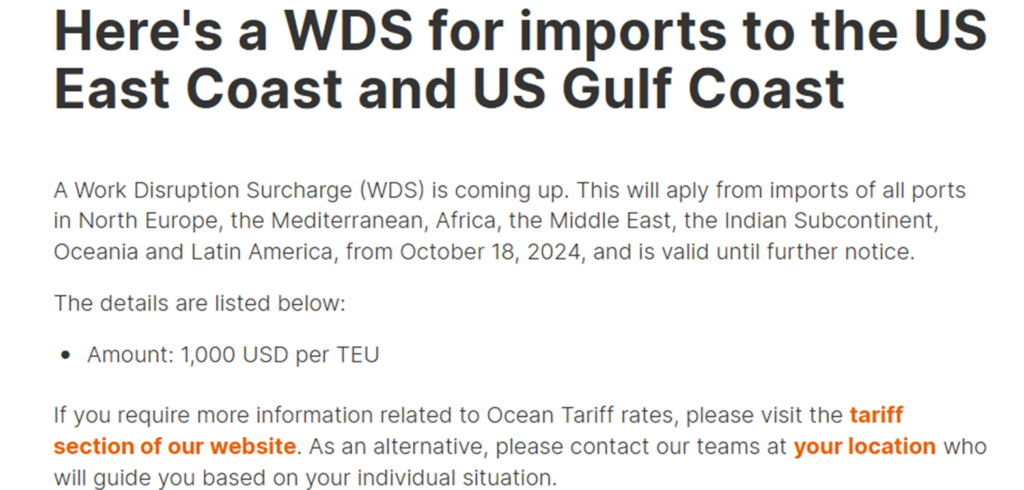
Last week, CMA CGM also announced that starting on October 11th, it will implement a “Local Port Charge” (LPC51) of $1,500 per standard container for cargo destined for East Coast and Gulf Coast ports. This surcharge will apply to all types of cargo from all origins and is meant to account for potential disruptions caused by the anticipated strikes.
Local Port Charge at destination (LPC51). – From: all origins. – To: US East Coast & US Gulf. – Cargo: all. – Amount: USD 1,500 per container.

